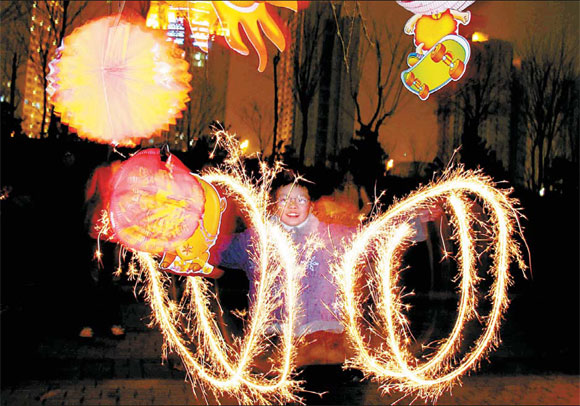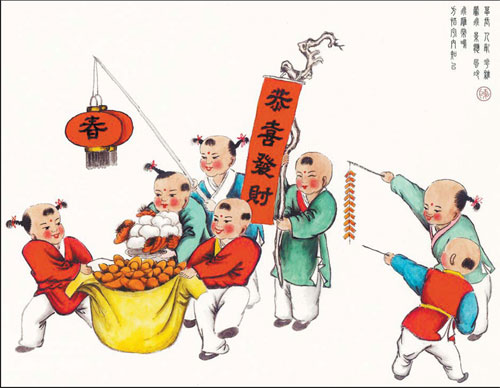A boy sets off fireworks to celebrate the Lantern Festival, on the 15th day of last year's Lunar New Year, like many other youngsters across the country. Cao Jiansong
Ask any Chinese what they like about celebrating Spring Festival, and chances are most will say there is nothing quite like starting off the Lunar New Year with a bang.
Adults still find it hard to resist, elders remain mesmerized and young ones, of course, squeal with delight at the chance.
Children will always look forward to that time of the year when they can hold in their hands the red-paper wrapped firecrackers - the power to herald the new year and shake up the neighborhood.
Others might simply wait, watch and cover their ears as they revel in a boisterous occasion befitting the most important time of the year.
Most adults and seniors too, would have fond memories of the treat, when they had to hide behind grown-ups before the blasts, or sit and even stand on shoulders to take in the myriad of colors from firecrackers that made it up into the night sky.
Firecrackers evoke emotions and meanings too many to fully mention - a big family spending time together, the reaffirming of bonds, the marking of one year to the next, and pure exhilaration.
The setting off of firecrackers during Spring Festival where family members reconnect at reunions - an occasion much like Christmas Eve in the West - is a celebration of culture and one that the Chinese can trace back to 2000 BC.
Like any myth, explanations abound for such an association.
But all of them have to do with nian, a monster that could swallow an entire village of people at one go.
Stories of nian's terrifying feats and humankind's efforts to battle it - mostly told on the eve of the new year - also vary.
One popular version entails a wise old man passing on the knowledge that nian feared loud noise and the color red.
So people put up red paper decorations on their windows and doors, and lit red firecrackers and banged on drums at the year end to scare off nian. They succeeded, and the monster never returned.
Over the centuries, this attempt to ward off evil and guo nian - or "survive the new year" - became deeply embedded in Chinese tradition.
There have been backlashes of the practice.
At the height of Western influence and political instability in the 1920s, the Kuomintang government attempted to abolish the Lunar New Year and the ways to celebrate it - including firecrackers. It was a bid to combat superstition and introduce Western thought in a blind embrace.
The farce started with a notice in December 1927 by warlord Feng Y-hsiang, or Feng Yuxiang, who also ordered the Henan, Shaanxi and Gansu governments to convert to the Western calendar beginning with Jan 1, 1928.
"All celebrations for the Lunar New Year must be shifted to the Western new year," it said. "(We) must never celebrate lunar festivals again."
Obviously, Feng's attempt failed ultimately.
Advocates of the Western calendar continued to lobby for the change over the next two years. In 1929, Chiang Kai-shek's government officially banned the lunar calendar and all relevant celebrations from 1930 onwards.
Local administrations followed suit by shifting all celebrations, including the use of firecrackers, to Jan 1 and even banned the writing of spring couplets. In Anhui and Hebei provinces, firecrackers were banned.
Similarly, in January 1930, the Beijing municipal government went as far as to punish police chiefs in areas where the sound of firecrackers were heard.
None of these worked.
Firecrackers, drums, bright lights, all-night revelry on the eve of the new year - nothing has changed.
"All around, in the courtyards of homes and on the streets, there was the sound of firecrackers, and the smell of sulfur in the air. Fathers shed their dignity, grandfathers were more amiable than ever, and children blew whistles, wore masks and played with clay dolls," prominent scholar Lin Yutang wrote in the 1930s.
"The National Government of China has officially abolished the Lunar New Year, but the Lunar New Year is still with us, and refused to be abolished," he wrote.
"So amid the booming firecrackers, I sat down to the Lunar New Year's Eve dinner. And I felt very happy in spite of myself," Lin said.
Decades later, in the 1980s, people were still embedded in the same traditions their ancestors passed on. Hundreds of cities had banned fireworks in urban areas out of security.
In one of the most widely reported cases, Beijing residents were banned from lighting firecrackers in 1993.
But many persisted with the tradition. Now, more than 100 cities that had banned firecrackers have lifted the restrictions during the holiday season. Beijing, too, partially lifted the ban in 2005, with an overwhelming majority of residents supporting the decision.
The bans have been difficult to implement, in part because of how closely linked firecrackers are with Chinese tradition, but also because such traditions are different across the country.
Nationwide, people light the visual treats before or at the stroke of midnight on the eve of the Lunar New Year and all of new year's day, but local customs for setting firecrackers at other times vary.
In the north, firecrackers are a must on the morning of Po Wu, the fifth day into the Lunar New Year and the birthday of the God of Wealth. This is the day when people stay home and tidy rooms to welcome the deity.
Once a family completes the cleanup, family members would set large, red firecrackers over the garbage piled outside their doorstep. The resulting blasts of the firecrackers would "sweep the poor devils away", according to ancient beliefs.
In other - mostly southern - parts of the country, however, long strings of firecrackers must also be used on the seventh day of the new year, the birthday of mankind and the God of Fire, as well as on the 15th day of the lunar calendar, the Lantern Festival and the last day of the holiday season.
But with unprecedented snowstorms in the central, southern and eastern provinces this month, the situation this year is bound to be different.
The disruption of transport networks in Liuyang in Hunan province, where the country's largest firecracker production base is situated, has severely limited the firecracker industry there.
Power outages have also affected the transport of firecrackers out of the province. But firecrackers bought by vendors as early as last October are still available for residents in snow-hit Changsha, the provincial capital, and other disaster-hit regions, such as the cities of Jingzhou and Wuhan in Hubei province, local residents said.
This Nianhua, a traditional Chinese painting popular for new year decorations, depicts the scene of how children celebrate Spring Festival in the old days. Courtesy of deskcity.com
(China Daily February 5, 2008)



